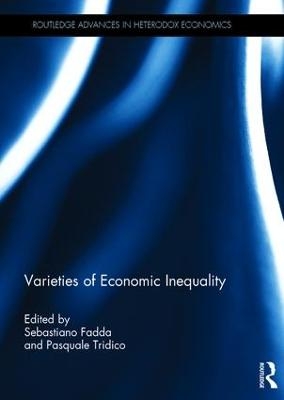
Varieties of Economic Inequality
Routledge (Verlag)
978-1-138-92801-5 (ISBN)
Varieties of Economic Inequality considers both theoretical perspectives and empirical evidence of aspects such as income, gender, race, technology, power, region, education and class. Ultimately, this text rejects the idea of supposed long run constant factor shares, the positive effects of inequality and the greater importance of absolute level of income compared to its unequal distribution, and instead reveals the structural inequalities that exist within societies.
This book advocates a move away from the focusing on inequality at the level of the individual and suggests policy for eradicating these various forms of inequality. It is suitable for those who study political economy, social inequality as well as economic theory and philosophy.
Sebastiano Fadda is Professor in the Department of Economics, Roma Tre University, Italy. He teaches advanced labour economics, and economic growth. Pasquale Tridico is Professor in the Department of Economics, Roma Tre University, Italy. He is lecturer in labour economics and in economic policy. He is also Jean Monnet Chair in European Economic Studies.
Introduction: Bridging theories and varieties of inequality Part I: Definitions and Approaches 1. Not just slicing the pie: The need for a broader approach to economic inequality. Pasquale De Muro, Roma Tre University 2. Income inequality. What causes it and how to curb it. Sebastiano Fadda, Roma Tre University 3. Class and gender during the European crisis. Valeria Cirillo, Sapienza University of Rome, Marcella Corsi, Sapienza University of Rome, and Carlo D’Ippoliti Sapienza University of Rome. 4. Economic inequality, political power and political decision-making: the case of the "middle-income trap". Svenja Flechtner and Stephan Panther, European University of Flensburg Part II: Empirical evidences and Policies suggestions 5. Welfare models, Inequality and economic performance during globalisation. Pasquale Tridico, Roma Tre University 6. Labour market institutions and wage inequality within education groups in Europe. Cristiano Perugini and Fabrizio Pompei, University of Perugia 7. Do institutions matter? Comparing inequalities in the governance of the EU. Charlie Dannreuther, University of Leeds 8. Modern technologies, modern disparities? Regional inequalities and innovations in Old and New Eu countries. Beata Woźniak-Jęchorek Poznań University of Economics, Poland and Jacek Wallusch, Institute of Cliometrics and Transition Studies, Poznań. 9. A classification of school-to-work transition regimes Short running title: School-to-Work Transitions. Francesco Pastore, Seconda University of Naples and IZA Bonn. 10. Youth Unemployment and the Disadvantages of the Young in the Labour Market. Enrico Marelli, University of Brescia, and Marcello Signorelli, University of Perugia.
| Reihe/Serie | Routledge Advances in Heterodox Economics |
|---|---|
| Zusatzinfo | 26 Tables, black and white; 47 Line drawings, black and white; 47 Illustrations, black and white |
| Verlagsort | London |
| Sprache | englisch |
| Maße | 174 x 246 mm |
| Gewicht | 566 g |
| Themenwelt | Sozialwissenschaften ► Politik / Verwaltung ► Politische Theorie |
| Sozialwissenschaften ► Soziologie ► Gender Studies | |
| Wirtschaft ► Allgemeines / Lexika | |
| Wirtschaft ► Volkswirtschaftslehre ► Wirtschaftspolitik | |
| ISBN-10 | 1-138-92801-1 / 1138928011 |
| ISBN-13 | 978-1-138-92801-5 / 9781138928015 |
| Zustand | Neuware |
| Informationen gemäß Produktsicherheitsverordnung (GPSR) | |
| Haben Sie eine Frage zum Produkt? |
aus dem Bereich


